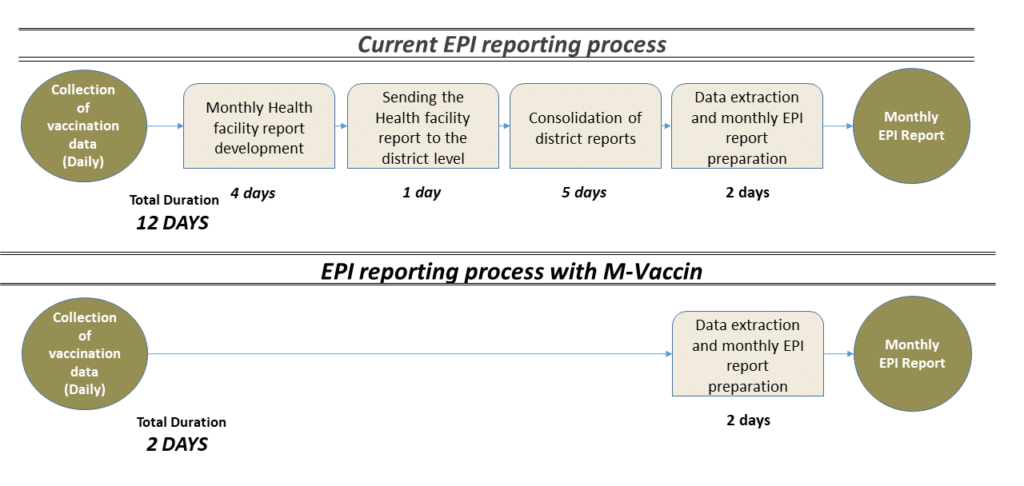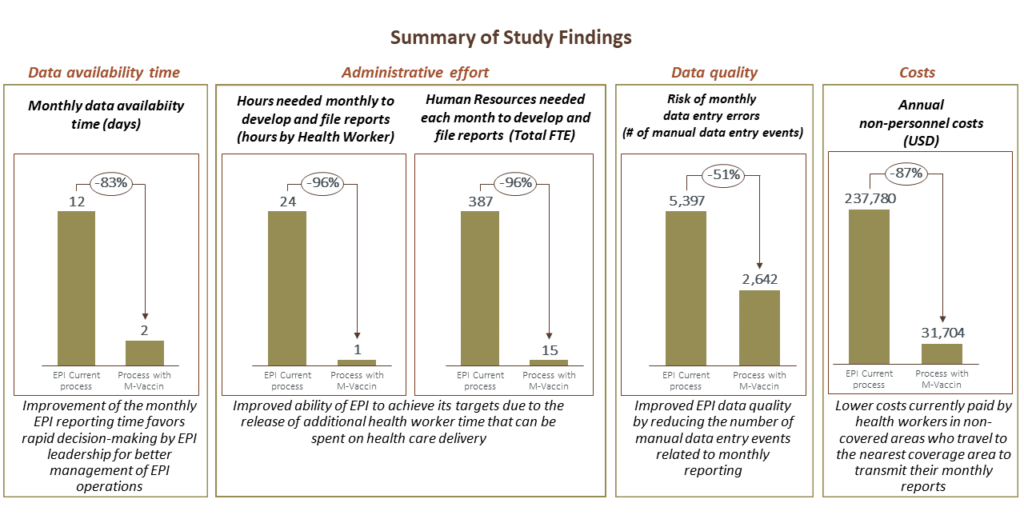
Recent health issues around the world have brought attention to overworked medical staffs and the necessity for efficient preventative health measures like immunisations. Countries all over the world are actively looking for novel solutions to these demands. One significant instance may be seen in Côte d’Ivoire, where the Ministry of Health has led the development of a ground-breaking digital tool known as M-Vaccin in collaboration with VillageReach and Orange. This novel approach aims to increase immunisation rates while expediting the delivery of healthcare. M-Vaccin has the potential to drastically cut administrative hassles by an astounding 96% if scaled up nationally, revolutionising healthcare accessibility and resource allocation in the nation.
Despite the fact that over 80% of people worldwide now receive routine vaccinations during the past four decades, progress has stalled Global immunisation rates have lately declined, from 86% in 2019 to 84% in 2022. Public health issues with zero-dose and under-immunized populations still exist in Africa. Due to the enormous barriers these populations encounter in getting access to life-saving vaccines, vaccination rates are lower and they are more susceptible to avoidable diseases.
The lack of health professionals in the area, which makes it challenging to inform underserved populations about the value of immunisation, administer vaccines, and provide frequent follow-up care, is a significant contributing factor. Addressing this issue is consistent with Gavi’s 5.0 strategy, which aims to improve the workforce and health systems of African nations.
The lack of health professionals in the area, which makes it challenging to inform underserved populations about the value of immunisation, administer vaccines, and provide frequent follow-up care, is a significant contributing factor. Addressing this issue is consistent with Gavi’s 5.0 strategy, which aims to improve the workforce and health systems of African nations.
The problem with healthcare resources
The lack of health professionals in Côte d’Ivoire worries the administration a lot. Although 16,481 healthcare professionals were hired between 2016 and 2020, there are still not enough health workers. Despite rising from 6.6 in 2015 to 8 in 2019, the number of health care workers per 10,000 people is still below the minimum WHO-recommended criterion of 23. At the same time, Cote d’Ivoire’s population has increased by 2.5% annually on average and more medical services, such as immunisations, are available.
The lack of healthcare employees puts a pressure on the current staff and restricts their ability to meet the rising demand for services. only half of all medical services In 2019, just over fifty percent of the medical treatments provided by primary care clinics were used. These elements have a detrimental effect on the nation’s healthcare services.
How resource constraints impact vaccination
In Côte d’Ivoire, the Expanded Programme on Immunisation (EPI) is essential for preserving the health of young children and pregnant women. The shortage of healthcare professionals has a significant impact on this programme. In response, under the direction of VillageReach, the EPI has joined forces with Gavi, the Vaccine Alliance, and Orange, a private communication firm. As a result of this collaboration, M-Vaccin was created, an innovative digital platform and electronic immunisation registry (EIR) that uses current mobile networks to SMS-remind parents of immunisation appointments. The tool decreases the amount of time health professionals spend reporting, freeing them up to spend more time delivering healthcare to individuals in need.
the role that health professionals a significant part in reporting during vaccination sessions, however the procedure can take some time. In all 113 districts of Côte d’Ivoire’s health institutions, it entails meticulously tracking the number of children who receive vaccinations and those who discontinue receiving them. The obtained data must subsequently be examined and made available to the EPI management team via a dashboard. The existing method, however, relies heavily on manual labour and requires a lot of front-line healthcare professionals’ time and energy.

M-Vaccin and other Electronic Immunisation Registries (EIRs) expedite and increase the effectiveness of this procedure. These registries improve vaccination programme management and digitise data, saving time from important health workers in a number of ways.
Accessibility and management of data: M-Vaccin replaces conventional paper-based records, enabling health professionals to enter, access, and analyse data with speed and accuracy. As a result, they have more time to devote to offering vaccination services.
Better Decision Making: M-Vaccin makes real-time data tracking possible, enabling health professionals and decision-makers to quickly spot regions with low immunisation coverage or where outbreaks may happen.
Reduced immunisation Duplication: A centralised, easily accessible registry reduces the risk of immunisation duplication, saving time and resources.
Effective recall and reminder systems: M-Vaccin automatically notifies parents or carers of immunisation appointments that are coming up, eliminating the need for health professionals to manually keep track of and communicate schedules.
A centralised, digital immunisation database makes it easier for managers to monitor the performance of their staff, give them customised coaching, and determine training requirements. Productivity and service delivery are improved as a result.
M-Vaccin solves the issue of scarce resources for immunisation
The current four-step, 12-day method for monthly EPI reporting is as follows:

Currently, this procedure requires the annual labour of 387 full-time employees. However, if M-Vaccin is widely used throughout the nation, this administrative burden can be drastically decreased to just 15 full-time equivalents, a 96% reduction. As a result, 372 health care professionals, or 8% of the total workforce, might be redirected to provide patient care.

M-Vaccin frees up healthcare professionals to spend more time interacting with the public, spreading the word about vaccinations, and providing other crucial services. By facilitating prompt follow-ups with carers and minimising the time required for administrative reporting, it helps to raise the proportion of children who have received all recommended vaccinations. With M-Vaccin, EPI can increase immunisation rates and safeguard the health of Côte d’Ivoire’s mothers and children while maintaining the same staffing levels.
Contact sie.kambire@villagereach.org for further details.
The VaccinesWork blog of Gavi, The Vaccine Alliance also discusses M-Vaccin. View more: Mobile technology is being used for vaccination in Côte d’Ivoire under the name M-Vaccin, according to the Vaccine Alliance (Gavi).








